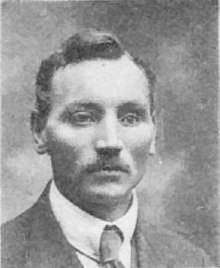Josef Lübbring
Josef Lübbring (born July 26, 1876 in Ahaus , † November 9, 1931 in Dortmund ) was a German craftsman (bricklayer), union official, state official (police president) and politician (SPD).
Live and act
Josef Lübbring was born in 1876 as the son of a tailor . From 1882 to 1890 he attended elementary schools in Münster and Essen-Ruhr. He then learned the mason trade from 1890 to 1893 . In 1896 he joined the Social Democratic Party of Germany (SPD). At the same time he became a union member.
In 1903 Lübbring was appointed trade union secretary in the construction workers' association in Essen-Ruhr. As the leader of a large movement that militantly demanded wage increases in the construction industry of the time, Lübbring served several longer sentences between 1900 and 1905. From 1908 to 1911 he held the position of trade union secretary in Wiesbaden . After attending the SPD party school in Berlin from 1910 to 1911 , from April 1911 to 1919 he was district manager at the German construction workers' association for the province of East Prussia . From 1915 to 1924 he was a city councilor in Königsberg . After the end of the First World War and the November Revolution of 1918, Lübbring was also a member of the Workers 'and Soldiers' Council in Königsberg in 1918/19 . In the latter capacity, he took part in the Congress of Workers and Soldiers in Berlin from December 16 to 20, 1918. At that time he was also Vice Chairman of the Provincial Council for East Prussia.
From January 15 to June 30, 1919, Lübbring was the representative of the Reich Commissioner for the East. In the same year he became a member of the constituent national assembly in Weimar. He then belonged to the Reichstag in Berlin from 1920 to September 1930 as a member of his party for constituency 1 (East Prussia) . On July 1, 1919, Josef Lübbring, who was notorious for his harshness, was appointed police chief of Königsberg. In February 1924 he was transferred to Dortmund in the same position. He led the local police headquarters energetically and successfully. He put anti-republican police officers in their place and distinguished himself in particular through his consistent fight against the emerging National Socialism.
Fonts
- Our revolution. Three speeches given at a public assembly on November 28, 1918 in Koenigsberg in Prussia, in the courtyard , 1918. (together with Alfred Gottschalk and Max Heydemann)
literature
- Daniel Schmidt: Protect and serve. Policemen in the Ruhr area in democracy and dictatorship 1919–1939. Klartext-Verlag, Essen 2008, ISBN 978-3-89861-929-5 ( Villa ten Hompel. History location. Recall, research, learn. Writings 9), (At the same time: Münster, Univ., Diss., 2007: Die Schutzpolizei im Ruhr area in the interwar period. ).
- Martin Schumacher (Hrsg.): MdR The Reichstag members of the Weimar Republic in the time of National Socialism. Political persecution, emigration and expatriation, 1933–1945. A biographical documentation . 3rd, considerably expanded and revised edition. Droste, Düsseldorf 1994, ISBN 3-7700-5183-1 .
Web links
- Literature by and about Josef Lübbring in the catalog of the German National Library
- Josef Lübbring in the database of members of the Reichstag
Individual evidence
- ↑ Johannes Buder: The Reorganization of the Prussian Police 1918-1923 , 1986, p. 260.
| personal data | |
|---|---|
| SURNAME | Luebbring, Josef |
| BRIEF DESCRIPTION | German craftsman (bricklayer), trade union official, state official (police president) and politician (SPD), MdR |
| DATE OF BIRTH | July 26, 1876 |
| PLACE OF BIRTH | Ahaus |
| DATE OF DEATH | November 9, 1931 |
| Place of death | Dortmund |

